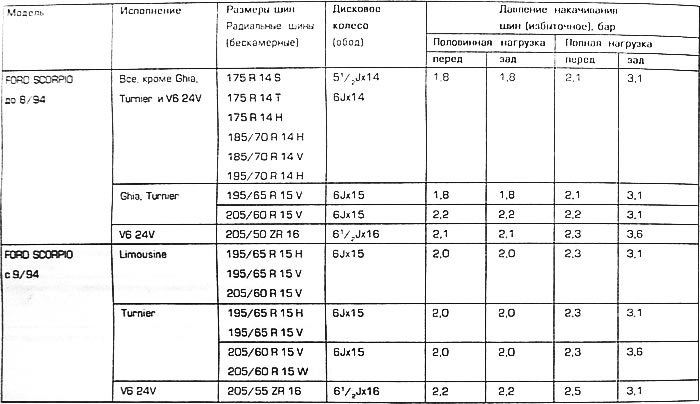All disk wheels are made in the form of so-called deep hump rims. The hump is a protrusion pressed onto the rim shelf, which, even during extremely sharp turns of the car, does not allow the tubeless tire to come off the rim.
If tires and / or rims are installed that are not indicated in the documents for the car, then an appropriate entry must be made in the documents. As a rule, this requires the approval of the vehicle manufacturer.
Attention: Legislation requires that the allowable wear profile height of tires be at least 1.6 mm. However, for safety reasons, it is recommended to change summer tires at a profile height of 2 mm and winter tires at a profile height of 4 mm.
The tire inflation pressure is also given in the vehicle owner's manual.
Attention: The technical improvement of cars continues. It may be that other inflation pressures and correspondingly other combinations of tires and rims are allowed. In this regard, it is recommended to inquire about the current parameters of the wheels at the service station.
The inflation pressure for the spare wheel should be the highest inflation pressure for the rear axle when fully loaded.
When operating a vehicle with a sight, the tire pressure must be increased to inflation pressure at full load.
For sporty driving, it is recommended to increase the excess pressure in the tires of the front and rear wheels by 0.2 bar. When increasing, it is necessary to proceed from the base value of excess pressure, normalized for different loads.
All inflation pressure data refer to cold tires. Pressure that has increased as a result of a long journey, for example from 0.2 to 0.4 bar, does not need to be lowered. Winter tires are generally operated at an inflation pressure of 0.2 bar higher, the inflation pressure recommended by the winter tire manufacturer must be observed. Since tires with winter tread patterns have a maximum speed limit, the speed limit in the driver's field of vision must be observed (§36. paragraph 1 of the Technical requirements for the operation of road transport - StVZO)
Attention: If the vehicle is operated at a speed of more than 160 km/h for a long time or constantly, it is necessary to increase the tire pressure in accordance with the recommendations in the table below. If the speeding occurs for a short time, then it is not necessary to increase the pressure in the tires.
Increasing tire pressure for long trips at high speed
| Shipi version / speed code | Prolonged movement at high speed. km/h | Additional increase in pressure for every 10 km / h, bar |
| H.V.W.ZR | from 160 to 190 | 0.1 |
| H.V.W.ZR | from 190 to 210 | 0.2 |
Wheel and tire sizes / tire inflation pressure

Visitor comments